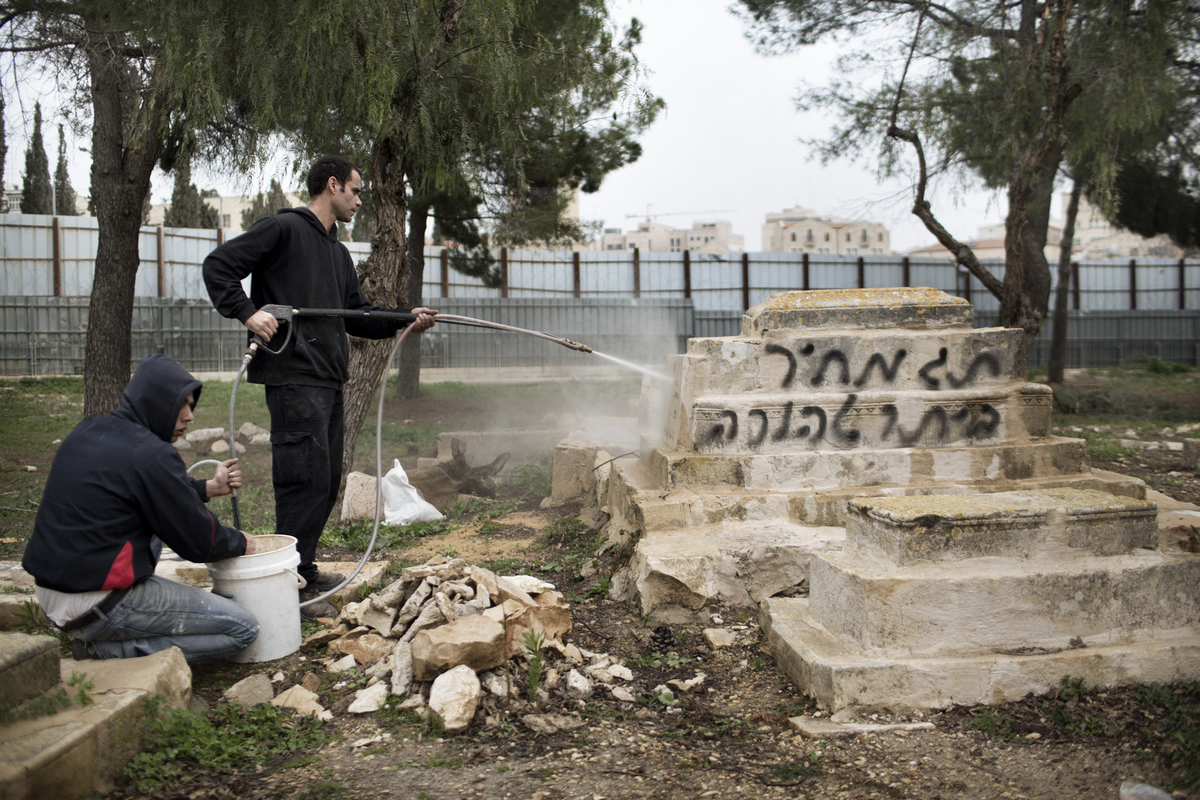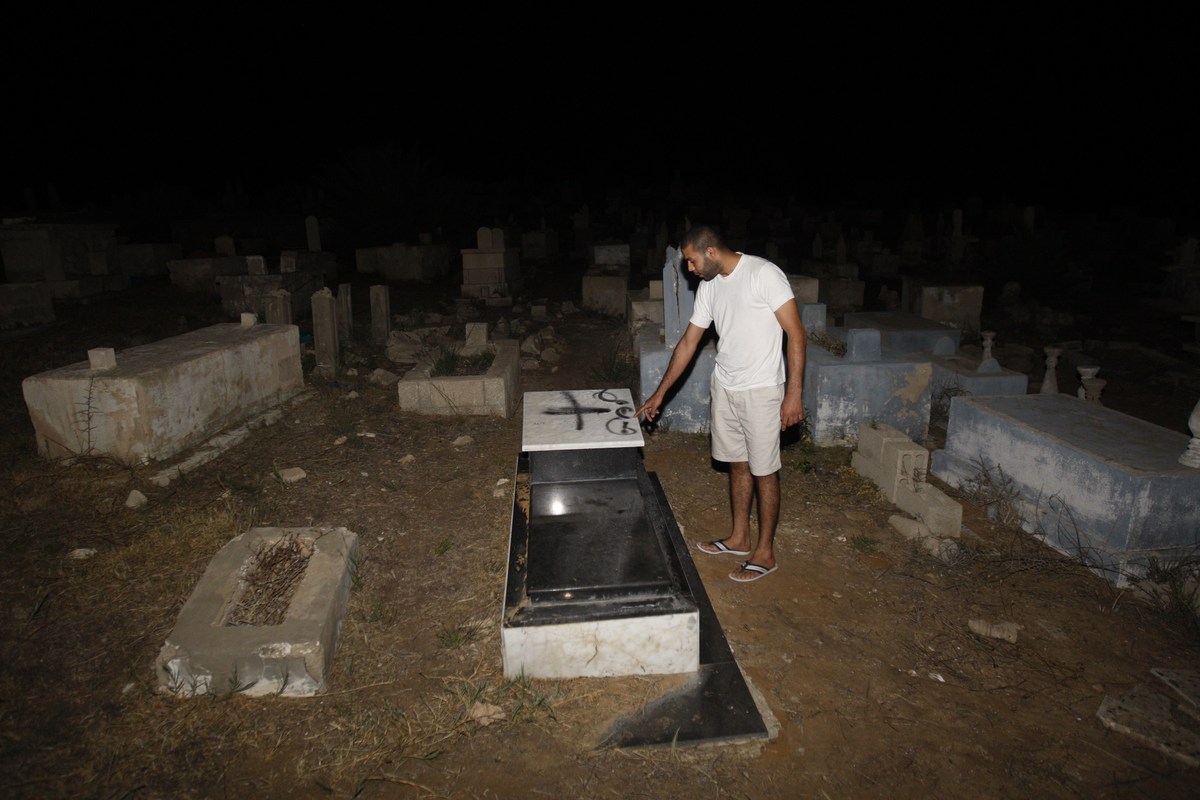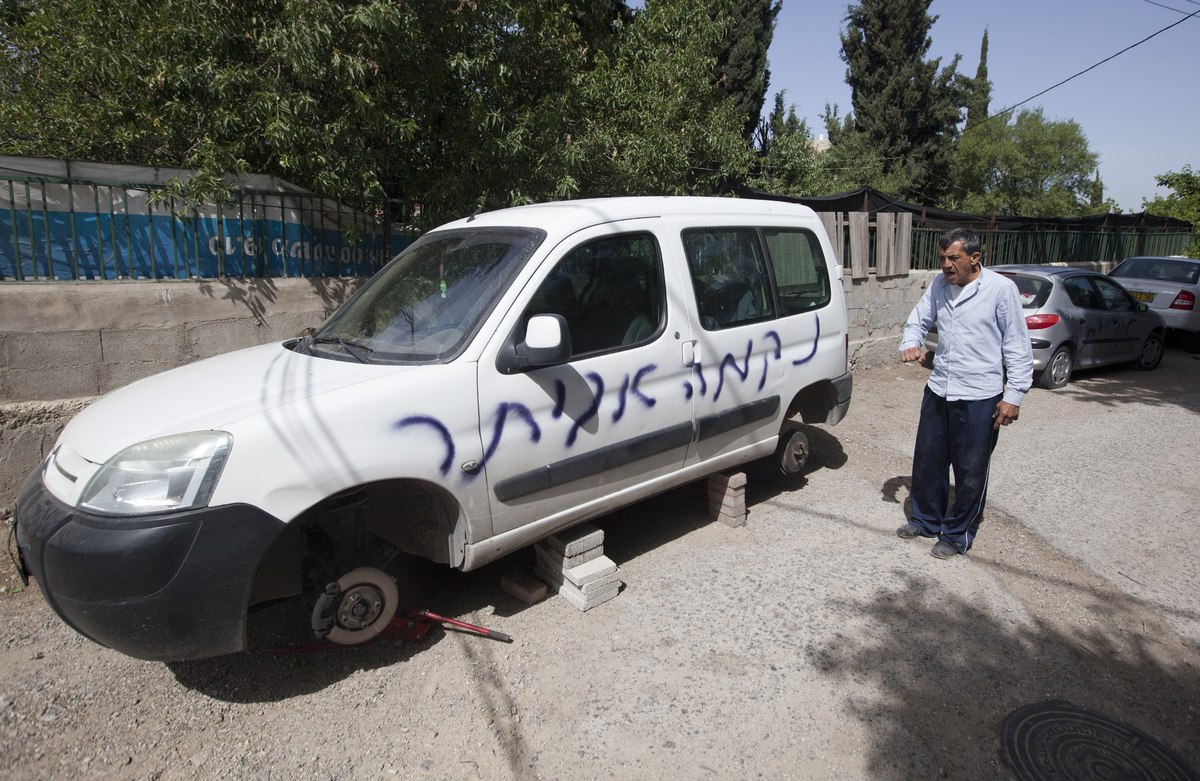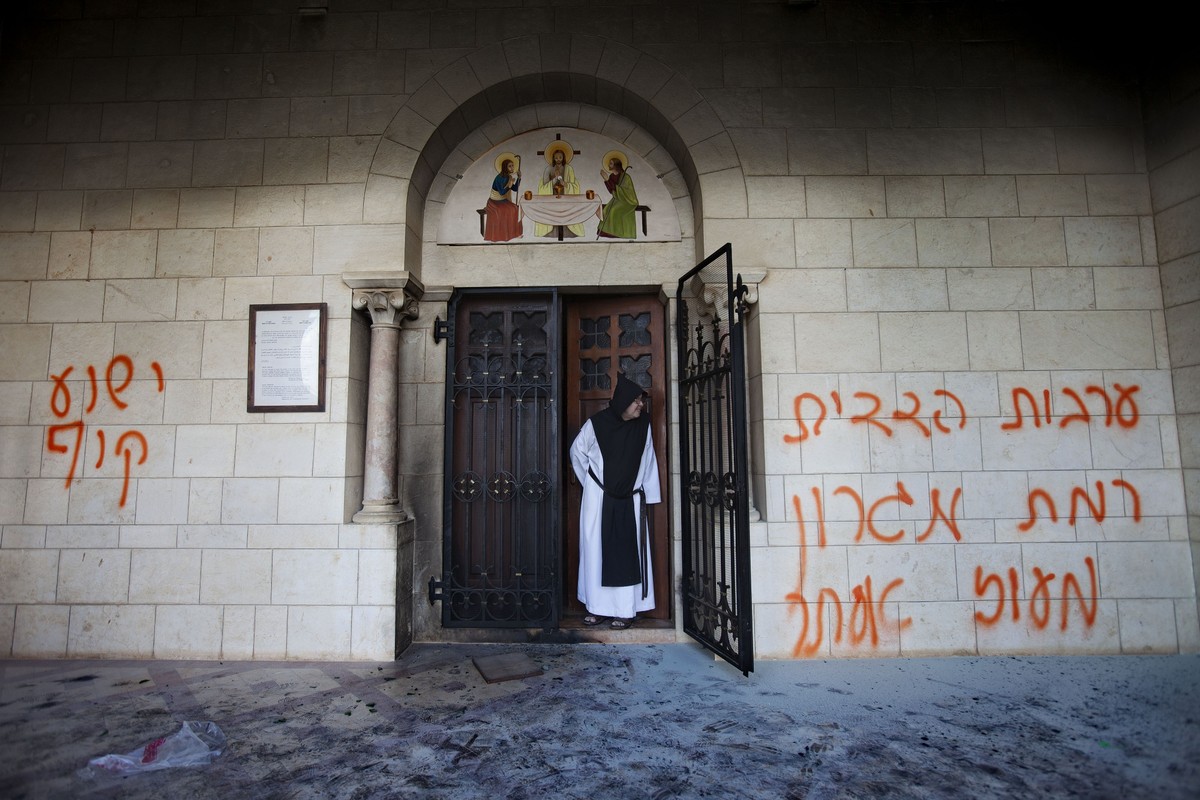Achieving Jewish dominion through spray-cans
David Sheen’s article is followed by a news report of an Israeli government crackdown on pro-settler vandalism. The inclusion of Christian buildings in the attacks threatens Israel’s image in the USA.

Municipal workers erase the words ‘Price Tag’ spray-painted in Hebrew on a gravestone at the Mamun Allah cemetery, an old Muslim cemetery in Jerusalem, February 2013. The price tag attack was an apparent revenge for the evacuation of the outpost of Maale Rehavam, destroyed by Israeli forces in the West Bank. Photo by Marco Longari, AFP/Getty Images)
Israel’s racists step up attacks on Palestinian citizens
By David Sheen, Electronic Intifada
June 24, 2013
Why are communities of Palestinian citizens of Israel increasingly the victims of racist vandalism at the hands of Jewish Israelis? Why were cars in Abu Ghosh damaged last week? Why were gravestones in Jaffa desecrated last month? Why was a school in Wahat al-Salam defaced last year?
Are attacks on these communities reprisals for anti-Semitic attacks that emanate from them? Is it because the sons of Wahat al-Salam crash cars into Jews? Is it because the youth of Jaffa perpetrate terrorist attacks against Israelis? Is it because the residents of Abu Ghosh provide protection to anti-Zionist suicide bombers?
The attacks listed in the first paragraph of this article actually occurred, but the ones listed in the second paragraph are totally false — I just fabricated them. No residents of these communities have been accused of committing crimes motivated by nationalism — or anti-nationalism, for that matter.
Even if any of them had been, it would not justify the collective punishment of these communities. But it would at least provide motives for attacks on these communities, motives that some Israelis might sympathize with: “revenge” for prior attacks on Jews, “intimidation” to prevent future attacks on Jews.
But again, residents of these communities are not suspected of having committed any hate crimes against Jewish Israelis. So what could be the motive for attacking them? In addition to the prescriptive messages spray-painted in previous attacks — “Arabs Out” and “Death to Arabs” — the perpetrators of the most recent acts of vandalism also included another slogan, one that does point to motive: “Racism or Assimilation.”
“Racism or assimilation”

“Death to Arabs” and “Price tag” were spray painted again on graves in Muslim and Christian cemeteries, Jaffa last month. Photo of an attack in 2011 by Ahmad Gharabli/AFP/Getty Images.
For outsiders unfamiliar with the internal Israeli discourse, this phrase needs to be parsed. The vandals have posited these two nouns — “racism” and “assimilation” — as either-or options for Jewish people living in Israel. Aligning themselves with the first option, the perpetrators are acknowledging that their attacks on Palestinian communities are motivated by racism, and they are calling for more of the same. The other option, the alternative to racism, is the choice that they loathe: assimilation.
What is this creature called assimilation, and why do these self-professed racists hate it so much? Assimilation is simply the process by which individuals, or groups of individuals, adopt ideas from other individuals and groups of individuals. These racists want to prevent Jewish people from adopting ideas of other people because they want all Jewish people to adopt their own ideology: Jewish Dominionism.
Dominionists seek to transform the State of Israel from a democratic ethnocracy into a theocratic ethnocracy. The current government, a relatively secular regime that grants extra privileges to Jewish people on the basis of their ethnicity, is insufficiently Jewish in their opinion. The Dominionists want all affairs of state and all public spaces in Israel to conform to the rules of Orthodox Judaism.
If the Dominionists’ dreams were realized and they were able to forge the face of the state, what would it look like? At the first public conference of the Dominionist “Derech Chaim” movement in March, I listened to the movement’s leaders flesh out their shared vision for the future. They bemoaned the legal obstacles that hinder the accomplishment one of their main objectives: physically separating Jewish citizens from non-Jewish citizens in Israel.
Segregation
Dominionists do not make up a majority of the Jewish population in Israel; if they did, they would already have turned Israel into a full-fledged theocracy. But their desire to physically separate Jewish people and non-Jewish people into separate areas is shared by the secular segregationists, who do make up a majority of the Jewish population.
Secular segregationists do not want the country to be governed under the strict rules of Orthodox Judaism, but for their own racist reasons they would prefer to not have to see any non-Jewish Arab people as they go about their daily lives. When they seek medical attention at hospitals or recreation at amusement parks, there seems to be an increasing consensus among the majority of Jewish Israelis that religious segregation is a positive phenomenon.
To be sure, there are parts of Israel in which Jewish people and non-Jewish people choose to live close to each other and get along fairly well. They are few and far between, but they exist, and among them are Abu Ghosh, Jaffa and Wahat al-Salam. It is precisely because Jews and Arabs live there in relative peace that these communities are attacked. It is the option of Israelis and Palestinians living in a multicultural environment that the Dominionists want to eliminate.
If the government of Israel not only enabled segregation but also simultaneously enabled groups of Jews, Arabs and others to establish multicultural institutions and heterogenous communities, it could at least claim to be adhering to a libertarian interpretation of the right to equal treatment under the law. But there is only one such Palestinian-Israeli intentional community in the entire country — Wahat al-Salam — and as its first Palestinian resident told me just days before he died last year, it exists not because of the Israeli government’s efforts, but in spite of them.
While (what are likely) disorganized groups of Dominionist hooligans carry out physical attacks on mixed Arab-Jewish communities like Wahat al-Salam, highly organized groups of Dominionist activists move into mixed Arab-Jewish towns across the country with the avowed objective of preventing “assimilation” and eventually driving out the non-Jewish residents (Amy Teibel, “Devout Israeli Jews moving to Arab-Jewish cities,” Associated Press, 4 October 2012). And in the last three years, top Israeli political and religious leaders have stepped up their efforts to segregate areas of the country into Jewish and non-Jewish.
Racist rulings
In 2010, first dozens, and then hundreds, of chief rabbis on the government payroll issued a religious edict forbidding Jews from renting apartments to non-Jewish people. The rabbis justified their racist ruling by citing passages of the Bible which call for ethnic cleansing the land of Israel and implementing complete racial segregation (Deuteronomy 7). Their ruling still stands, and no disciplinary action was ever taken against the rabbis.

A new government bill currently being debated in the Knesset would permit Israeli businesses to give preferential treatment to people who have served in the army. Although the law would also have a negative impact on some other groups, it is a thinly veiled attempt to sanction discrimination against Palestinian citizens of Israel, who, as a rule, do not serve in the military. If the law is enacted, it would essentially extend the legal right to segregate by religion to land developers in any area of the country, including downtown Tel Aviv.
After last week’s embarrassing attack in Abu Ghosh, just as a long list of Hollywood stars were visiting Jerusalem only a couple of kilometers away, Prime Minister Benjamin Netanyahu was quick to condemn the attack, saying that it contradicted the values of the Israeli people, and of the Jewish religion (“PM: ‘Price tag’ attacks contradict values of Jewish people and state,” The Jerusalem Post). While that may be true for some Israelis, and for some adherents of Judaism, these racist attacks are clearly in sync with the values of large number of Jewish Israelis, including secular segregationists such as Netanyahu himself, and the Jewish Dominionists that are his power-brokering political partners.
David Sheen is an independent writer and filmmaker. Born in Toronto, Canada, Sheen now lives in Dimona, Israel. His website is www.davidsheen.com and he can be followed on Twitter: @davidsheen.

Latrun monastery spray-painted with anti-Christian – one read, “Jesus is a monkey” – and pro-settler graffiti September 4, 2012. Photo by Oded Balilty/AP.
Israel launches crackdown on pro-settler vandal ‘terrorists’
By Dan Williams, Reuters
July 01, 2013
JERUSALEM – Israel announced a crackdown on Monday against Jewish ultranationalists who vandalise Palestinian property, saying they were tantamount to terrorists and their attacks could fan sectarian violence.
The move followed the arrest of a 22-year Israeli from an Orthodox Jewish town near Tel Aviv for the vandalism of a Christian monastery in the occupied West Bank last year. The attack was carried out in solidarity with hardline Jewish settlers.
Graffiti left on the 19th-century Latrun Monastery referred to Migron, an unauthorised settler outpost evacuated by the Israeli government. The words “Jesus is a monkey” were also daubed on the wall in Hebrew, and the monastery’s doors torched.
Defence Minister Moshe Yaalon said those suspected in so-called “Price Tag” incidents would now be subject to measures such as longer detentions and denial of access to lawyers while under interrogation – measures akin to those used by Israel’s security services in tackling Palestinian militants.
“Price Tag perpetrators’ conduct is identical to the conduct of modern terrorist groups, including ideological inspiration and covert action,” the Defence Ministry said in a statement.
“Its main objective is to prevent the legitimate Israeli government from carrying out moves, whether of state or regarding law enforcement, and to sow fear among the nation’s leaders of making decisions of one kind or another.”
The ultranationalists have desecrated mosques, torched cars and chopped down trees belonging to Palestinians, saying they sought to make the government “pay” for curbing unauthorised West Bank settlement
They have occasionally hit Israeli army facilities, churches or Arab sites inside the Jewish state. But Israeli authorities are most troubled by the possibility that Palestinian victims could lash out in reprisal, upending the West Bank’s relative calm at a time of peacemaking stalemate.
“It is our duty to toughen up the penalties against these miscreants, because this activity has catastrophic potential,” the statement quoted Yaalon as saying. “We must fight an all-out war against them, with minimum tolerance and maximum means.”
IMPUNITY
Palestinians, who exercise limited autonomy in the West Bank under 1993 interim peace deals, have long complained settlers enjoy impunity under Israeli military control of the territory.
Israel’s Shin Bet security service says dozens of suspects have been arrested. But convictions have been rare, a fact Israeli officials blame on suspects’ secrecy and withstanding of pressure to confess under interrogation.
Settler leaders have disavowed the Price Tag perpetrators, many of whom are self-styled “Hilltop Youths,” zealots in their teens or 20s who spurn the authority of the secular state.
In one incident last August, six Palestinians were hurt when their taxi was firebombed. Several Israeli minors from a settlement were arrested but released for lack of evidence.
Notes and links
The aims of Derech Chaim (Hebrew) are to achieve the union of all Jews from around the world and to secure a government based on Torah principles.Dominionism began as a Christian evangelical movement in the USA. They believe their country should be governed by Christians on strictly Biblical principles.
“And God blessed them, and God said unto them, Be fruitful, and multiply, and replenish the earth, and subdue it: and have dominion over the fish of the sea, and over the fowl of the air, and over every living thing that moveth upon the earth.” Genesis 1:28
